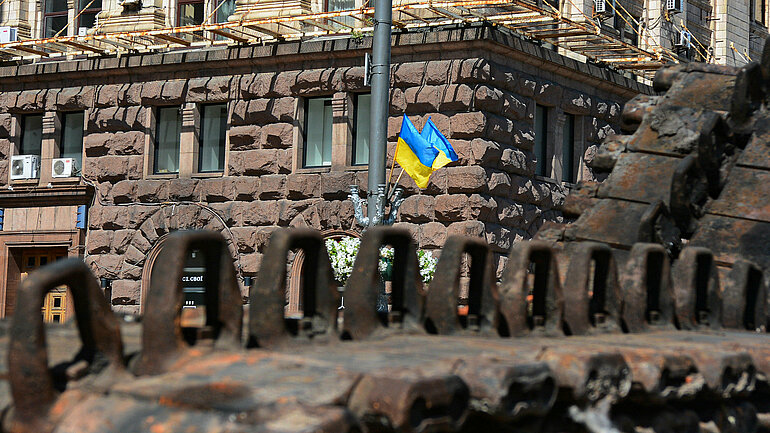'The war did not begin only in February 2022'

In her book Russia’s War Against Ukraine (Russlands Krieg gegen die Ukraine), Gwendolyn Sasse puts the tumultuous events of February 2022 into their political and social context. Offering a social science perspective, she explains the developments in Ukraine which preceded the Russian invasion and analyses the role that Ukraine plays for a increasingly authoritarian Russia.

What is it like, as a political scientist, to write a book about a war while it is still ongoing?
There cannot be any expectation that the author will put each individual war-related event into context or, indeed, speculate about how and when the war might end. The book is an analysis of the background from a social science and historical perspective; it looks at how the conflict came about and explores the dynamics that we are currently seeing unfolding. I am particularly interested in the dynamics within society. For example, why are we seeing this large-scale military and civilian resistance in Ukraine?
In the Introduction, you say that it is also about correcting the widespread yet incomplete picture of Ukraine. Which elements are missing from the picture?
For me, it was particularly important to show that in reality, the war did not start in February 2022; it began in 2014, with the annexation of Crimea. It continued in the war in the Donbass, where Russia already played a key role, and then culminated in the invasion and full-scale assault on Ukraine from February this year. I also felt it was important to show that we really could have known much more about Ukraine as a state and society. Much of what now seems so surprising has featured in our observations for quite some time, including, in particular, the emergence, some time ago, of a social consensus in Ukraine in support of democratisation and a Western-oriented policy course, and also an identity that embraces Ukraine’s diversity and is focused on an inclusive state.
Any background study or attempt to explain the war must, of course, also include an analysis of Russian policy. So the critical question is this: what is Ukraine’s significance for Putin?
Ukraine plays a very significant role in terms of the Russian system’s self-image, which means that it is extremely important to Vladimir Putin as president of this authoritarian state. With its orientation towards the West and its transformation into a democratic system, Ukraine poses a risk to Russia, which, after all, embodies a very different governance model, a different political model. In my view, and as I explain in the book, one of the factors behind the war is Russia’s worry since 2014 that the Ukrainian political model might have feedback effects in home; this would, of course, limit Russia’s imperial power claims.
Which topics do you think are missing from the public debate here in Germany about the war? What were some misconceptions, in hindsight?
On the one hand, it is quite understandable that the debate here is naturally focused on Germany itself and the impacts of the war on us, but I also have the sense that sometimes, not enough consideration is given to the background and to conditions within Ukrainian society. On the other hand, the view of Russia tends to be overly preoccupied with the leadership. We have to consider society in Russia too, especially in light of what we are seeing at present following the Russian mobilisation. For me, it is also important to rethink the terminology that we use to comment on or analyse developments in Ukraine and Russia, but also the war. We often use terms such as “Ukraine war”; previously, it was always the “Ukraine crisis”. This creates the impression that these are domestic developments and conflicts within Ukraine. But we should use the correct nomenclature and make it clear that this is Russia’s war against Ukraine, and that is reflected in the title of the book. In hindsight, we can certainly see that Western – including German – policy contained omissions and misconceptions about Russia’s intentions. The West, especially Germany, completely underestimated the political risk that could potentially emanate from Moscow; it was assumed that this risk could be managed through economic ties. We are learning the lesson of this war too late: such a high level of dependence on an authoritarian system for our energy supply is fraught with risks.
There was a widespread sense after 24 February 2022 that nothing would ever be the same again. Can any conclusions be drawn at this stage on what this transformation might look like?
We now sense that we have reached a watershed moment and I believe that this is expressed in the widespread feeling of uncertainty which extends far beyond Ukraine and Russia. There are already very clear signs that the West’s perspective is shifting. A more nuanced view of Eastern and Central Europe is emerging, and Ukraine in particular now features much more prominently in our consciousness. It is a tragedy, of course, that it took a war to achieve this on such a scale. We are also seeing change continuing in Russia. We don’t know yet which direction this will take – there are various possibilities. There may be even more of a shift towards authoritarianism; alternatively, the system might break apart. In the midst of the war, global interlinkages are also becoming highly visible. In some places, the war really is making its presence felt; we are seeing this particularly in the food crisis. The positions adopted by various countries and regions in relation to the West and its sanctions, or indeed in relation to Russia, are by no means as clear-cut as we might have expected. In other words, power relations are shifting at the global level as well.
The interview was conducted by Stefanie Orphal, Communications director ZOiS.
Prof. Dr. Gwendolyn Sasse is the Director of ZOiS and Einstein Professor for the Comparative Study of Democracy and Authoritarianism at Humboldt-Universität zu Berlin.
Gwendolyn Sasse: Der Krieg gegen die Ukraine. Hintergründe, Ereignisse, Folgen. C.H.Beck, 2022.
